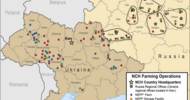
Plans of Russia’s Far Eastern Zabaikalsky region to allow Chinese firms to rent sizeable plots of land has drawn vocal protests in Russia, including a series of online petitions demanding to annul the would-be-deal. (Photo: FT)
Russians wary of land deals with China
BY SERGEI BLAGOV
Plans of the local authorities of Russia’s Far Eastern Zabaikalsky (Transbaikal) region to allow Chinese firms to rent sizeable plots of unused land entailed nationwide debates. These controversial land lease plans appeared to revive Russia’s fears of the ‘yellow threat,’ perceived Chinese intentions to swallow vast under-populated areas in the Russian Far East and Southern Siberia.
Earlier this month, the authorities of Zabaikalsky region signed a memorandum of understanding (MOU) with China’s Huae Xingbang, a subsidiary of Zoje Resources Investment. The MOU envisages the lease of 115,000 hectares of unused land at 250 rubles ($4.6) per hectare in Nerchinsko-Zavodskoy, Uletovsky, Sretensky and Shilkinsly districts for 49 years.
Chinese investors reportedly pledged to invest 24 billion rubles ($438 million) to develop agricultural businesses relying on Chinese workforce there. The MOU also envisages the subsequent lease of 200,000 hectares if the first project proves a success.
The plan, notably the proposed massive influx of Chinese workers, entailed vocal protests in Russia, including a series of online petitions demanding to annul the would-be-deal.
Politicians in Moscow also did not remain silent. On June 22, the nationalist Liberal-Democratic Party (LDPR) warned of risks renting land in under-populated Zabaikalsky region to companies from neighboring and overpopulated China. There are no guarantees that the Chinese workers could not be naturalized, then become a majority and seize power in these regions in 20-30 years, said Igor Lebedev, vice-speaker of the State Duma, the lower house of parliament, representing LDPR. They could proclaim these lands to be China’s territory eventually, he said.
The Kremlin has refrained from comments on the proposed deal. However, on June 24 the Russian Agriculture Ministry said the deal was not approved by the ministry’s officials.
Facing increasing criticism, the local authorities defended themselves. On June 22, Zabaikalsky region governor Konstantin Ilkovsky said in televised remarks that no binding agreement was concluded with Chinese firms. There were only mutual exchanges of intentions, Ilkovsky said.
In contract, other local officials in the Russian Far East pledged to refrain from controversial land lease transactions. On June 23, the economy minister of Yakutiya region Valery Maximov pledged not to sign land lease agreements with Chinese businesses.
Zabaikalsky regional authorities appeared to review their plans. On June 25, Ilkovsky said the land lease agreement could be reviewed from 49 years down to 25 years. However, he still insisted that the planned deal was fully legal and no discussion on it at the federal level was required.
The would-be land lease deal apparently served to revive old fears of the “yellow threat” in the Russian Far East. Notably, Viktor Ishayev, head Khabarovsk regional government in 1991-2009, and then presidential envoy in Far Eastern regions, voiced similar concerns more than a decade ago. In early 2000s, he vocally complained that Chinese maps allegedly painted vast areas of the Russian Far East “in Chinese colors”. Ishayev warned of the perceived “yellow threat” and speculated that China was considering the annexation of the Russian territory.
However, in 2003 President Vladimir Putin strongly dismissed Ishayev’s concerns. Subsequently, Ishayev and other local politicians refrained from the “yellow threat” wording and did not mention perceived Chinese plans to take over Russian lands.
More recently, similar fears resurfaced in Moscow. In August 2012, then President Dmitry Medvedev urged to protect the country’s Far Eastern regions from what he described as excessive migration inflows of foreign nationals.
Meanwhile, in the past two years the Ukrainian crisis and subsequent rift with the West forced the Kremlin to prioritize its “strategic partnership” with China. The Kremlin’s silence on the proposed land lease deal arguably indicates reluctance to antagonize China, despite some domestic discontent.












